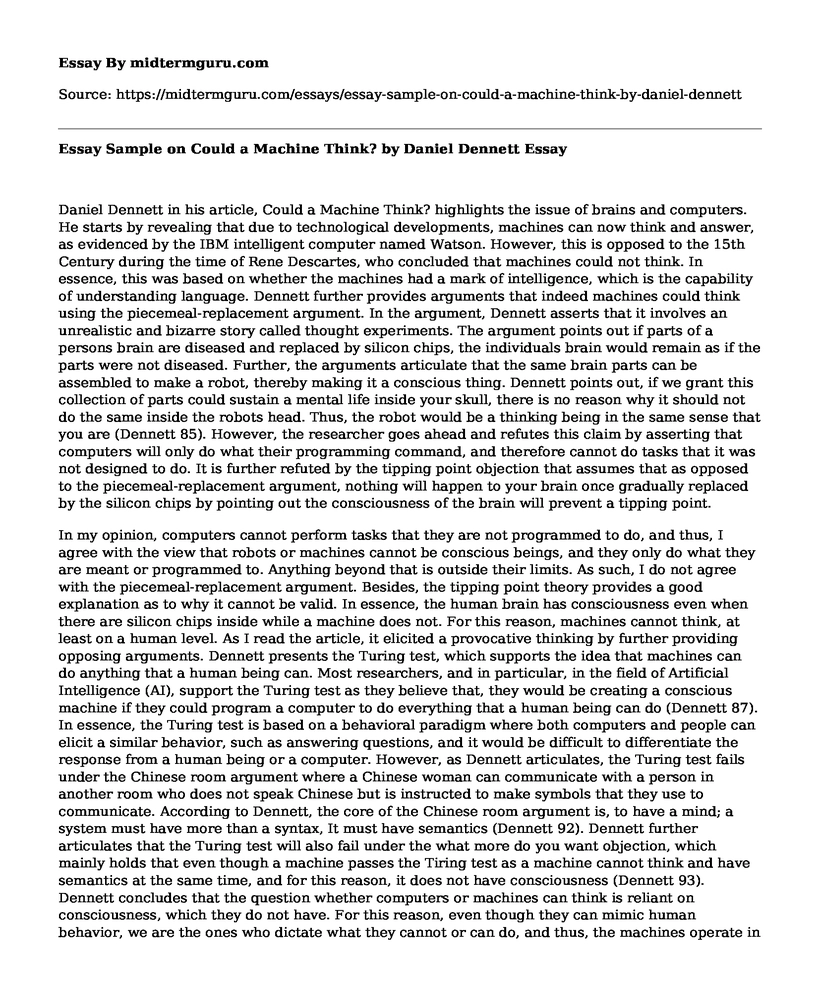Daniel Dennett in his article, Could a Machine Think? highlights the issue of brains and computers. He starts by revealing that due to technological developments, machines can now think and answer, as evidenced by the IBM intelligent computer named Watson. However, this is opposed to the 15th Century during the time of Rene Descartes, who concluded that machines could not think. In essence, this was based on whether the machines had a mark of intelligence, which is the capability of understanding language. Dennett further provides arguments that indeed machines could think using the piecemeal-replacement argument. In the argument, Dennett asserts that it involves an unrealistic and bizarre story called thought experiments. The argument points out if parts of a persons brain are diseased and replaced by silicon chips, the individuals brain would remain as if the parts were not diseased. Further, the arguments articulate that the same brain parts can be assembled to make a robot, thereby making it a conscious thing. Dennett points out, if we grant this collection of parts could sustain a mental life inside your skull, there is no reason why it should not do the same inside the robots head. Thus, the robot would be a thinking being in the same sense that you are (Dennett 85). However, the researcher goes ahead and refutes this claim by asserting that computers will only do what their programming command, and therefore cannot do tasks that it was not designed to do. It is further refuted by the tipping point objection that assumes that as opposed to the piecemeal-replacement argument, nothing will happen to your brain once gradually replaced by the silicon chips by pointing out the consciousness of the brain will prevent a tipping point.
In my opinion, computers cannot perform tasks that they are not programmed to do, and thus, I agree with the view that robots or machines cannot be conscious beings, and they only do what they are meant or programmed to. Anything beyond that is outside their limits. As such, I do not agree with the piecemeal-replacement argument. Besides, the tipping point theory provides a good explanation as to why it cannot be valid. In essence, the human brain has consciousness even when there are silicon chips inside while a machine does not. For this reason, machines cannot think, at least on a human level. As I read the article, it elicited a provocative thinking by further providing opposing arguments. Dennett presents the Turing test, which supports the idea that machines can do anything that a human being can. Most researchers, and in particular, in the field of Artificial Intelligence (AI), support the Turing test as they believe that, they would be creating a conscious machine if they could program a computer to do everything that a human being can do (Dennett 87). In essence, the Turing test is based on a behavioral paradigm where both computers and people can elicit a similar behavior, such as answering questions, and it would be difficult to differentiate the response from a human being or a computer. However, as Dennett articulates, the Turing test fails under the Chinese room argument where a Chinese woman can communicate with a person in another room who does not speak Chinese but is instructed to make symbols that they use to communicate. According to Dennett, the core of the Chinese room argument is, to have a mind; a system must have more than a syntax, It must have semantics (Dennett 92). Dennett further articulates that the Turing test will also fail under the what more do you want objection, which mainly holds that even though a machine passes the Tiring test as a machine cannot think and have semantics at the same time, and for this reason, it does not have consciousness (Dennett 93). Dennett concludes that the question whether computers or machines can think is reliant on consciousness, which they do not have. For this reason, even though they can mimic human behavior, we are the ones who dictate what they cannot or can do, and thus, the machines operate in accordance with our programming.
Therefore, from what I have understood reading Dennetts article, machines can exhibit a human behavior, as supported by the Turing test. However, they can never have consciousness, as they cannot have semantics. Even though they can generate syntax based on the programming, they are not in a position to have semantics or mental consciousness. Besides, they can only perform within the limits of their programming. For this reason, even though the machines can think, they can only do so based on what they have been programmed to do. Anything beyond that they cannot. As such, no single theory can support the idea that computers can fully operate on their own without human intervention, and they can never have consciousness, as they cannot mimic out semantics. For this reason, even though the advancement of technology has allowed machines to think, they can only do so under our command.
Work Cited
Dennett, Daniel. Could a Machine Think Problems from Philosophy, 3rd Ed by Rachels, James. McGraw-Hill, 2011, pp 83-94.
Cite this page
Essay Sample on Could a Machine Think? by Daniel Dennett. (2021, Jun 07). Retrieved from https://midtermguru.com/essays/essay-sample-on-could-a-machine-think-by-daniel-dennett
If you are the original author of this essay and no longer wish to have it published on the midtermguru.com website, please click below to request its removal:
- Internet Impact on Youth Culture - Essay Example
- Paper Example on Network Security Issues with Wireless Technology
- Research Paper on Cybercrime
- Essay Sample on the Hacking of Home Network
- Information Security Domains: Access Control and Administration - Essay Sample
- Software Requirements Specification - Essay Sample
- Machine Language: Basics of 1s and 0s - Essay Sample







